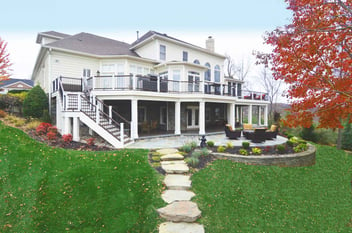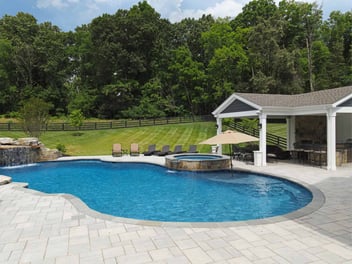5 Min Read
How Often Should a Pool Be Replaced or Resurfaced?
Owning an inground pool promises relaxation and fun but requires regular care and maintenance to ensure it remains in good condition. However, maintenance will only get you so far. One of the most important aspects of pool maintenance is understanding when your pool needs resurfacing or replacement. This is particularly true if you’ve recently inherited a pool that might not meet your standards or suit your aesthetic preferences. In this blog, pool installation experts Deckscapes of Virginia dive deep into determining whether your pool needs attention, explore the life expectancy of various pool types, and discuss why a long-lasting gunite pool might be your best investment. Ready for our small but mighty masterclass in pool preservation? We’re in session below.

Pool Resurfacing and Replacement 101
What is Pool Resurfacing?
Pool resurfacing restores the surface of an inground pool to improve its appearance and functionality. Over time, a pool's surface can deteriorate due to exposure to chemicals, weather conditions, and regular wear and tear. Resurfacing involves removing the old surface layer and applying a new one, which can help extend your pool’s life and upgrade its look. Various materials are used in pool resurfacing, depending on the type of pool. For concrete and gunite pools, resurfacing often involves applying a new layer of plaster, aggregate finishes, or tiles. Fiberglass pools may need a gel coat application, while vinyl pools require replacing the vinyl liner.
What Triggers the Need for Pool Replacement?
While resurfacing is a common maintenance practice, there are situations where a pool may need to be replaced entirely. Some problems can’t and shouldn’t be repaired at the surface level. Pool replacement is typically considered when extensive structural damage or resurfacing is insufficient to maintain the pool’s appearance and safety. Some common signs that it may be time to replace your pool include major cracks, persistent leaks, outdated systems that can’t be upgraded, or a pool design that no longer fits your needs or style.
Longevity and Replacement Factors for Different Pool Types
Your pool’s longevity and your plan to address any concerns about it depend on the kind of pool you have. Here are our area's most common pool types, how long you can expect them to last, and unique factors to consider when maintaining and replacing each kind of pool.

Concrete Pools
Concrete pools, including those made with gunite, are known for their durability and strength. On average, a concrete pool can last anywhere from 25 to 50 years, depending on various factors such as the quality of construction, materials used, and ongoing maintenance. Regular resurfacing every 10 to 15 years maintains the pool’s integrity and aesthetic appeal. Signs that a concrete pool may need resurfacing include cracks, rough surfaces, and discoloration. If structural damage is extensive, such as large cracks or persistent leaks, it might be more cost-effective to consider pool replacement rather than continual repairs.
Deckscapes Creates Gunite Pools
Gunite pools, a type of concrete pool, offer superior longevity and versatility, making them a popular choice for homeowners who want a durable, long-lasting pool. One of the main advantages of gunite pools is their flexibility in design and shape, allowing for custom features that cater to individual preferences and backyard layouts. A well-built gunite pool can last a lifetime with proper maintenance, though resurfacing is typically needed every 10 to 15 years to address normal wear and tear and keep the pool looking its best.
Gunite pools often have extensive warranties from reputable installers like Deckscapes of Virginia. These warranties surpass those typically offered for fiberglass or vinyl pools, providing peace of mind that your investment is protected for many years to come.

Fiberglass Pools
Fiberglass pools have a smooth, non-porous surface that is resistant to algae and requires less frequent cleaning and chemical usage than concrete pools. While fiberglass pools are generally easier to maintain, they have a shorter lifespan than gunite pools, typically lasting around 20 to 30 years. Common issues that may necessitate resurfacing or replacement include cracking of the fiberglass shell or fading due to UV exposure. If the shell becomes compromised or there are severe cosmetic issues, a full replacement may be required.
Vinyl Pools
Vinyl liner pools are often the most affordable option for inground pools, but they also have the shortest lifespan. The vinyl liners typically need to be replaced every 7 to 10 years, depending on factors such as usage, chemical balance, and exposure to sunlight. Vinyl pools are more prone to tears, punctures, and fading, which can lead to more frequent maintenance and replacement costs. Homeowners with vinyl pools may eventually consider upgrading to a more durable option like a gunite pool, especially if they plan to stay in their home for many years and want to avoid recurring liner replacement costs.
Factors Influencing Pool Longevity
Maintenance
Regular maintenance is one of the most crucial factors in extending the life of your pool, regardless of the type. Proper maintenance includes regularly cleaning the pool, balancing the water chemistry, and ensuring that all equipment, such as pumps and filters, are functioning correctly. Neglecting these aspects can lead to problems such as algae growth, surface staining, and even structural damage over time.

Usage
How frequently and in what manner you use your pool also greatly impacts its longevity. Pools that are used heavily or for large gatherings may experience more wear and tear, leading to faster degradation of the surface and other components. Similarly, pools with features like waterfalls, fountains, or spas may require more frequent upkeep and potentially earlier resurfacing due to the additional stress these features place on the pool's systems and structure.
Quality of Installation
The quality of the pool installation plays a significant role in determining how long your pool will last. A well-maintained and installed pool, particularly one made from durable materials like gunite, can withstand decades of use with minimal issues. Conversely, pools installed with subpar materials or without proper attention to detail are more likely to suffer from issues such as leaks, cracks, and surface degradation.

Signs It's Time to Resurface or Replace Your Pool
Structural Damage
One of the most obvious signs that your pool needs resurfacing or replacement is structural damage. This can include cracks in the pool shell, leaking, or significant settling of the pool structure. These issues can compromise your pool’s safety and usability, potentially leading to more extensive damage if not addressed promptly. Small cracks might be manageable with minor repairs, but extensive structural damage often indicates that the pool’s foundation is weakening, which could necessitate a complete replacement.
Surface Degradation
Surface degradation is another common sign that your pool may need attention. Over time, pool surfaces can become rough, stained, or discolored due to constant exposure to chemicals, UV rays, and general wear and tear. If you notice that your pool surface feels rough or looks discolored despite regular cleaning, it might be time to consider resurfacing.
Outdated Systems
Outdated or malfunctioning pool systems can also signal that it’s time for resurfacing or replacement. This includes essential systems like filtration, circulation, and heating. When these systems become outdated or start to fail, more significant problems often result, such as algae growth or unbalanced water chemistry, which can damage the pool surface and structure.
Aesthetic Concerns
Sometimes, the decision to resurface or replace a pool isn’t about structural integrity or functionality but rather aesthetics. Over time, a pool’s design can become outdated, or it might no longer suit you or the overall design of the backyard. If you’ve inherited a pool that doesn’t meet your preferences or has significant issues, replacing it with a long-lasting custom gunite pool can give you the backyard oasis you’ve always wanted.
.jpg?width=1000&height=669&name=custom%20in%20ground%20pool%20with%20hot%20tub%20waterfall%20in%20northern%20virginia%20(1).jpg)
Deckscapes Builds Personalized Pools in Northern Virginia
Thinking about replacing your current pool or creating a brand new one in Fairfax, Loudoun, or Prince William Counties? Consider the benefits of a gunite pool with Deckscapes of Virginia. Our expert team specializes in collaboratively designing and installing high-quality gunite pools that offer unparalleled durability and aesthetic appeal. Contact us today to learn more about how a custom gunite pool can transform your backyard into a personalized retreat!




